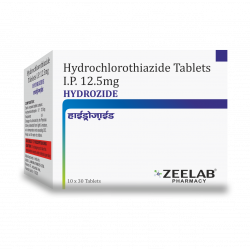Hydrochlorothiazide
Hydrochlorothiazide is a diuretic (water pill) commonly used to treat high blood pressure (hypertension) and fluid retention (edema). By helping the kidneys remove excess sodium and water from the body, it reduces the strain on the heart and lowers blood pressure. Hydrochlorothiazide is often used alone or in combination with other medications to manage these conditions, improving overall heart health and reducing the risk of stroke and heart attack.
Uses of Hydrochlorothiazide
- Used to treat high blood pressure (hypertension).
- Helps reduce fluid retention (edema) caused by conditions such as heart failure, kidney disease, or liver disease.
- May be used to prevent kidney stones by reducing calcium in urine.
- Sometimes prescribed in combination with other medications to improve blood pressure control.
How Hydrochlorothiazide Works
Hydrochlorothiazide works by blocking the reabsorption of sodium and chloride in the kidneys, which results in increased urine production. This helps reduce the amount of fluid in the blood vessels, lowering blood pressure and reducing swelling caused by fluid buildup.
Benefits of Hydrochlorothiazide
- Helps reduce high blood pressure, lowering the risk of stroke and heart disease.
- Reduces excess fluid in the body, helping prevent swelling and weight gain caused by edema.
- Improves heart function by lowering blood pressure, which reduces strain on the heart.
- Effective in treating conditions related to fluid retention, such as heart failure and kidney disease.
How to Take Hydrochlorothiazide
Hydrochlorothiazide is typically taken orally once daily, usually in the morning to prevent frequent urination during the night. It can be taken with or without food, and it’s important to follow the dosage prescribed by your healthcare provider. Ensure that you stay well-hydrated while taking this medication, and avoid taking it too late in the day to reduce the need to urinate overnight.
Types of Dosage Available
- Tablets (commonly prescribed for adults).
- Liquid form (for patients who have difficulty swallowing tablets).
Side Effects of Hydrochlorothiazide
- Common side effects include dizziness, headache, nausea, and dehydration.
- Serious side effects may include low potassium levels, high blood sugar, and allergic reactions such as skin rash or swelling.
- In rare cases, Hydrochlorothiazide may cause severe electrolyte imbalances or kidney problems.
Safety Advice
- Monitor your blood pressure regularly while using Hydrochlorothiazide.
- Notify your doctor if you have kidney problems, as Hydrochlorothiazide may affect kidney function.
- Drink plenty of fluids, but avoid excessive alcohol consumption while taking this medication.
- Inform your healthcare provider if you are pregnant, planning to become pregnant, or breastfeeding.
- Consult your doctor before using any over-the-counter medications, especially those containing high amounts of salt or potassium.
Frequently Asked Questions (FAQs)
Q: Can I take Hydrochlorothiazide if I am pregnant?
A: Hydrochlorothiazide should be used during pregnancy only if clearly needed. Consult your doctor before using this medication if you are pregnant or planning to become pregnant.
Q: How long will it take to see results with Hydrochlorothiazide?
A: The effects of Hydrochlorothiazide may be noticed within a few hours, but it may take a few weeks for the full benefits in managing blood pressure and edema to be visible.
Q: Can I take Hydrochlorothiazide with other medications?
A: Hydrochlorothiazide can interact with other medications, including blood pressure drugs, diabetes medications, and certain heart medications. Always inform your doctor of any medications you are taking.
Download India's most affordable pharmacy app
- Compare with medicine prices
- Save upto 90% on your medicine bills

Temperature Controlled storage and delivery

Regular Sanitization

Disinfected Packaging















 Added!
Added!